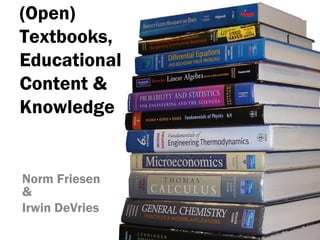
Open Textbooks, Educational content & knowledge
- 2. Overview • What is educational content? • Challenges in thinking about educational content • Textbooks and content: – Content structures and dynamics in textbooks – Series, Hierarchy, Network/CORE Cycle – Other design issues • Two Examples: Elsevier versus Wikibooks
- 3. Content "We learn anywhere, anytime, anyplace; there are opportunities to learn all around us everyday. We learn in the home, office, on the road. Likewise, educational content can be shaped to fit all kinds of useful delivery media that is convenient, user-friendly, and (most important) serves the educational need of members without the content being shortchanged or trivialized." Smith, J.(2001)
- 4. Constructivism • Emphasize knowledge construction, not reproduction • Providing complex learning environments that incorporate authentic (scientific) activity. • Support multiple perspectives and the use of multiple modes of representation. • Case-based/problem-based learning • Represent the natural complexity of the real world
- 6. Chambliss & Calfee Textbooks for Learning • “textbooks come in layers, something like an onion. The entire book, the outer husk, as signaled in the table of contents seldom receives the attention it deserves.” • How are the layers of the textbook constituted and combined? • Through structures on the level of sections and rhetoric (“rhetorical patterns”)
- 10. How is this done? • Connect: examples, relevant images, aesthetics, questions • Organize: design - column(s), page, section, chapter, table(s) of contents; rhetoric: structures covered above • Reflect: exercises, discussion, references and reviews, questions • Extend: examples, exercises, questions
- 11. Conceptual Development • First to Last • Problem and Solution • Least to Most • Whole to Parts Important • Concept to • Known to Unknown Description • Cause and Effect • Similarities and Differences • General and Specific Instances • Spatial ordering
- 16. These can all be combined: How many Dimensions are there?
- 17. Sample (e)Textbook features • Instructor tools • Learner tools – Instructor support side – Discussion questions – Presentation slides – Extended learning support – – Exam prep Class outlines – Flash cards – Extended resources – Mobile access – LMS-like tools – CD ROMs – Customization – Search – Note-taking – Highlighting – Bookmarking
- 18. Traditional textbook development processes • Multiple authors • Editors/proofreaders • Media specialists • Art department • Designers • Reviewers • Production/technical • Copyright specialists
- 23. “Psychology is an academic and applied discipline involving the scientific study of mental processes and behavior. Psych- ology also refers to the application of such knowledge to various spheres of human activity, including relating to individuals’ daily lives and the treatment of mental illness.” “Psychology differs from the other social sciences — anthropology, economics, political science, and sociology — in that psychology seeks to explain the mental processes and behavior of individuals.
- 24. Pedagogical Knowledge Exhibits a number of characteristics distinguishing it from scientific knowledge. As a rule it ... •only looks at a part of the whole •(radically) simplifies this knowledge •integrates it into a logical-seeming context •avoids contradictions and exceptions •makes knowledge appealing by means of various tools (slides, films, experiments, murals) •is taught with maximum efficiency
Hinweis der Redaktion
- Norm discuss this slide
